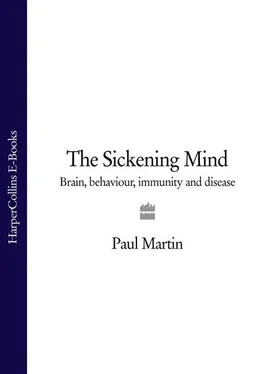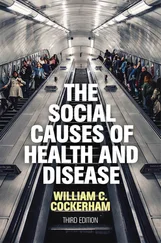The perception of sickness
There is a fundamental distinction between illness – the sufferer’s belief that something is wrong with them – and disease, which is a definable medical disorder that can be objectively identified according to agreed criteria. You can have a disease (such as early-stage cancer or coronary heart disease) yet not feel ill. Conversely, you can feel ill even though a doctor cannot detect any evidence of disease.
Many people who end up presenting themselves to a doctor have no identifiable organic disease. There is apparently nothing physically wrong with them. Yet they are still there in large numbers, claiming (and, in most cases, genuinely believing) that they are unwell. They are often referred to in rather loaded terms as ‘the worried well’. But the majority of those who are suffering from vague, undiagnosed illnesses are not malingering. They really do feel ill and their ability to lead a normal life may be significantly impaired.
According to a report by the Royal College of Physicians and the Royal College of Psychiatrists, as many as half of all those who present themselves as out-patients for ostensibly medical reasons are suffering from psychological problems. Although they have physical symptoms such as pains, palpitations or breathlessness they have no detectable physical disease. Doctors perhaps understandably focus on the physical symptoms rather than the psychological problems. One consequence is that huge amounts of time and money are wasted on diagnostic tests and treatments for elusive diseases.
A substantial proportion of patients – a fifth or more – prove very difficult for doctors to deal with. Either their illness cannot be diagnosed at all, or, when a diagnosis is proposed, they find it unacceptable. Their treatment, if any, is frequently ineffective and they keep returning to the doctor over and over again, distressed and dissatisfied. These are the so-called heartsink patients. To make sense of what is going on we must once again turn to the mind.
Health and illness lie along a continuum. Often the dividing line between the two is arbitrary, and as much a reflection of our perceptions and expectations as it is of our true state of physical health. Our psychological and emotional state affects our sensitivity to bodily symptoms, our perception and interpretation of those symptoms and, finally, our propensity to seek medical help – whether or not those symptoms reflect a genuine disease.
Those who seek medical care do so because they have noticed certain symptoms, concluded that these symptoms constitute a real or potential illness, and decided to take action. Each of these steps is open to psychological and emotional influences. Individuals differ enormously in the extent to which they monitor their own health; in their willingness to put up with pain, discomfort and worry; and in their readiness to do something about it. The processes that culminate in a decision to visit the doctor depend on factors that are unique to each individual, including their social and financial circumstances, personality, experience, cultural background and genetic make-up. A lot can also depend on their current psychological and emotional state.
When a person is stressed or anxious they may become preoccupied with their health. There is a greater likelihood that they will notice (or imagine) physical symptoms; interpret those symptoms as indications of disease; and become sufficiently anxious about them to visit a doctor. They may also be more in need of the personal attention that they are perhaps not getting from others.
The heightened arousal that accompanies anxiety can make subtle bodily symptoms more noticeable. Moreover, the physiological changes that often accompany anxiety, such as headaches, churning guts or palpitations, may be interpreted as symptoms of disease. The mind can unconsciously create a medical mountain out of a molehill.
Our own perceptions are not the only ones that matter when it comes to assessing our state of health. The perceptions of those around us can also play an important role. Social pressures can reinforce, or even create, the perception that we are ill.
Imagine you are under a lot of stress. (Perhaps you don’t have to imagine.) You have been told you are going to lose your job, your partner has left you and your personal finances are in meltdown. Unless you are exceptionally self-possessed your behaviour patterns will change noticeably. Perhaps you no longer relish the prospect of going for a drink with your friends; you feel depressed so you decline social invitations; you sleep badly and come to work looking tired; you are preoccupied with your problems and your performance accordingly suffers; you become irritable or keep bursting into tears; you go off your food and lose weight, or perhaps you turn to comfort feeding and pile on the calories instead.
Your friends and colleagues notice these changes and comment on them. They keep remarking that you don’t look well; it must be the stress; perhaps you should see a doctor. Come to think of it, you don’t feel too marvellous. Those headaches and the constant fatigue might be significant, and you have lost weight.
Before long you have convinced yourself that you are ill. You have certainly read enough magazine articles to know that stress is bad for your health. You take to your bed, or perhaps you trot off to see your doctor. To put it in the language of social psychology, social pressures have encouraged you to take on the ‘sick role’. Now, you may indeed be genuinely ill; as we shall see, there is no doubt that stress can make us more susceptible to disease. But the thought processes that have led you to the conclusion that you are ill were driven largely by social pressure. Other people’s minds, as well as your own, were involved in the process.
Consider, for example, the case of Colin Craven – the hypochondriac from hell in Frances Hodgson Burnett’s children’s classic The Secret Garden .
The obnoxious, bedridden Colin has been treated as an invalid, doomed to an early death, for all of his ten years. Everyone in Colin’s orbit unquestioningly accepts that he is destined to be a crippled hunchback – that is, if he lives at all. They continually reinforce Colin’s belief in his illness, reminding him of his weakness and urging him to rest. As one would expect, lying in bed all day has had a seriously debilitating effect on Colin’s muscles; on the rare occasions when he does get up he feels genuinely feeble.
The egregious brat lies in bed all day with the family retainers pandering to his every whim. The servants live in fear of Colin’s hysterical tantrums and dare not contradict him. The housekeeper privately recognizes that Colin is a victim of self-indulgence and hypochondria but would not dream of saying this to his face. To make matters worse, Colin’s doctor is next in line to inherit the family property should Colin die and is therefore less than objective about the child’s health. A London doctor who has had the temerity to suggest that Colin is not ill has been studiously ignored. Colin is immersed in his all-consuming hypochondria and sublimely unaware of how spoilt and unreasonable he is. Until his cousin Mary arrives.
Mary (who is not the nicest of children herself) rubbishes Colin’s alleged medical condition during a fit of pique. She tells Colin bluntly that he has no trace of a lump on his back and is just being hysterical.
By challenging the unquestioned belief in Colin’s illness, Mary has an electric effect on him. The supposed invalid soon comes to realize that there isn’t anything wrong with him beyond his morbid state of mind. There is no lump on his back; he is thin and pallid because he refuses to eat properly; and he is weak because he lies in bed all day.
Читать дальше












